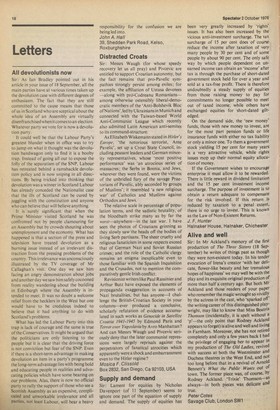All devolutionists now
Sir: As Ian Bradley pointed out in his article in your issue of 18 September, all the main parties have at various times taken up the devolution case with different degrees of enthusiasm. The fact that they are still committed to the cause means that those of us in Scotland who are sceptical about the whole idea of an Assembly are virtually disenfranchised when it comes to an election Whatever party we vote for is now a devolution party.
It could well be that the Labour Party's greatest blunder when in office was to try to jump on what it thought was the devolu tion bandwagon only to find it is a booby trap. Instead of going all out to expose the folly of the separatism of the SNP, Labour has retreated behind a ramshackle devolution policy and is now sniping in all directions. By being tricked into thinking that devolution was a winner in Scotland Labour has already conceded the Nationalist case that the ills of Scotland can be cured by juggling with the constitution and anyone who can believe that will believe anything.
It is surely significant that when the Prime Minister visited Scotland he was confronted not by people clamouring for an Assembly but by crowds shouting about unemployment and the economy. What has happened is that a section of the press and television have treated devolution as a burning issue instead of an irrelevant distraction from the pressing problems of the country. This irrelevance was unconsciously illustrated by the TV coverage of Mr Callaghan's visit. One day we saw him facing an angry demonstration about jobs and another day we saw him safely cocooned from reality wandering about the building in Edinburgh where the Assembly is intended to meet. It was no doubt a welcome relief from the hecklers in the West but one would have to be credulous indeed to believe that it had anything to do with Scotland's problems.
What has led the Labour Party into this trap is lack of courage and the same is true of the Conservatives. It might be argued that the politicians are only listening to the people but it is clear that the driving force is not conviction but fear of the SNP. Even if there is a short-term advantage in making devolution an item in a party's programme the long-term advantage lies with being bold and educating people in realities and advocating policies which have some bearing on our problems. Alas, there is now no official party to rally the support of those who see a Scottish Assembly as an expensive, complicated and unworkable irrelevance and all parties, not least Labour, will bear a heavy responsibility for the confusion we are being led into. John A. Hall 39, Shedden Park Road, Kelso, Roxburghshire


































 Previous page
Previous page